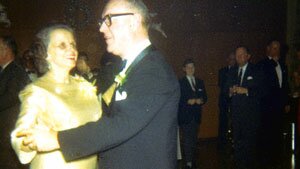MOVIE REVIEW- Reel life: Docu-drama shows truth behind family pictures
 PUBLICITY PHOTO
PUBLICITY PHOTO
Once upon a time, if a person learned some shocking news about their family's dysfunctionality they either repressed it or shared it with their best friend. Another generation told everything to a therapist, if they could afford one.
Today the good, bad, and ugly of our lives is instantly posted on Facebook; then the more creative among us turn it into art.
Morgan Dews is one of the latter. He may even have bypassed Facebook. For most of his life he had known his grandmother, Allis, as a widow who shared ancient home movies with him when he visited her in Vermont. The silent films showed his mother and uncles growing up in Hartford, Connecticut, in the 1950s and ‘60s. They looked like happy times– playing outside, going to the beach, the house decorated for Christmas...
Then Allis died in 2001 and Morgan discovered things she had kept, but kept from him: 50 hours of Dictaphone recordings and taped journals, and 300 pages of transcripts. They revealed things he'd never known about his grandparents, things worthy of a movie.
Must Read after My Death is that movie. It's being released on the Internet (@ www.giganticdigital.com) the same day (Feb. 20) it opens in New York. It's been compared to Capturing the Friedmans and Tarnation, but delves into a more ancient family history.
A comparison might be made with Revolutionary Road, both for the period in which it takes place and the themes explored, from open infidelity to a woman feeling unfulfilled in her role as housewife and mother.
In a reverse of the old silent movie format, Dews lets the audio tell the story– with occasional titles to establish times, places and details that aren't evident– while the visuals form a poetic accompaniment, sometimes in harmony with the prevailing mood and sometimes in counterpoint.
Allis married Charley in the ‘50s, at least the second marriage for both. By 1960, when the film begins, they have a daughter, Anne, and three sons, Chuck, Bruce and Douglas; and both are soon to turn 50.
Charley's job keeps him on the road 16 weeks a year, in such far-flung places as Australia, so they buy Dictaphones to send messages to each other and let Charley and the kids hear each other's voices while they're apart. As we hear these recordings, it becomes evident that they have an open relationship before it becomes fashionable.
It's Charley's idea because he's a party animal who likes to drink, dance, and screw, even when he's away from home. He tells Allis about the women he's met, even introducing one on a recording. But he's not an old-fashioned, double-standard guy. He encourages Allis to go out, too, even though by nature she's a "one-man dog." (Showing a boy and dog to illustrate this point is just a little too cute.)
Later in the decade, Allis starts keeping an audio journal on reel-to-reel tapes at her psychiatrist's urging. She reveals her frustration at having to keep house, which she's not good at, while being unable to realize whatever potential she might have had. Hearing their parents fight all the time makes the children act out in various ways, until Bruce is put in a mental institution for several months.
Charley blames Allis for everything that's wrong with the family. The viewer might blame her psychiatrist, who sounds ineffectual if not incompetent. In any case, they don't sound like the happy people we see on the screen in better days.
Unlike many documentary filmmakers, Dews keeps himself out of the story, other than being born near the end. He puts his family on the screen, warts and all, and lets you draw your own conclusions.
The entire film is subtitled, unnecessarily, since the audio recordings have held up amazingly well.
Must Read... is a must-see for students of psychology and social history, but its disturbing story is on a par with some of the best recent narrative films.
#